- Home
- THE FIRM+
- Criminal Defense+
- CASE RESULTS
- AREAS WE SERVE+
- FAQ’s
- Blog
- Contact
AZHARI LLC BLOG
Jun. 13 2018
Federal Criminal Cases: Breaking Down What Happens

Posted By: Sami Azhari
Category:
A recent ruling has determined that former Illinois representative Aaron Schock will most likely go to trial in federal criminal proceeding.
Schock was indicted in November 2016 for a litany of charges, including wire fraud, mail fraud, filing false federal tax returns, submitting inaccurate reports to the Federal Election Commission, making false statements, and theft of government funds.
Since then, he has been fighting the indictment, arguing that prosecutors were out of line when they charged him. However, a three-judge panel of a federal appeals court recently rejected Schock’s appeal. He is able to appeal this decision, but the federal criminal proceedings will most likely move forward.
Because laws are ever-expanding to allow federal courts to prosecute more crimes, it is important to understand federal criminal proceedings. Below we break down the federal rules of criminal procedure.
Investigation
The Federal Government has agencies that are charged with collecting and providing information to the US district attorneys with evidence for criminal investigations.
Federal agencies include:
- Federal Bureau of Investigation (FBI)
- Drug Enforcement Administration (DEA)
- Bureau of Alcohol, Tobacco, Firearms and Explosives (ATF)
- US Secret Services (USSS)
- Homeland Security Investigation (DHS/HSI)
Investigators employed by these agencies investigate the alleged crime and obtain evidence to help federal prosecutors understand the case.
The investigation may include a search warrant issued by a neutral and detached federal judge. This grants investigators the right to search the suspect’s home, clothing, computer, car, or other property.
Charging
After federal prosecutors have evaluated the investigation and talked with persons involved in the alleged offense, they will determine whether to put the case before a grand jury. If the prosecutors decide to take the case to trial, the suspect is indicted.
In this process, the suspect is given formal notice that he or she is suspected of committing a crime, which contains basic information about the alleged defense and informs the suspect of the charges against them.
Arraignment
Once a defendant is arrested and charged, he or she is brought before a judge for an initial hearing, or arraignment. This gives the defendant more information about the charges being brought and advises them of their rights. The judge also determines whether the defendant will be detained in prison or released until the time of the trial.
Discovery
Before beginning a trial, prosecutors will familiarize themselves with the crime, study evidence, interview witnesses, evaluate potential problems that could arise in the trial, and develop a trial strategy.
Prosecutors must also provide the defendant with a copy of the materials and evidence that will be used at trial. This is known as discovery, which continues from the time the case is opened until the time of the trial.
Plea Bargaining
In many cases, the government will offer a plea deal to the defendant to avoid trial and perhaps decrease the defendant’s sentence. This is known as plea bargaining. If the defendant pleads guilty, there is no trial, and the case proceeds to a sentencing hearing.
Pre-Trial Motions
Prior to trial, prosecutors may file motions, and must respond to motions filed by the defense. Motions are filed to ask that the court makes certain decisions prior to the trial. Motions can affect how the trial proceeds, courtroom procedures, defendants charged, evidence presented, or testimony allowed.
Trial
After weeks, months or even years of preparation, the trial can begin. This is the process where the facts of the alleged offense are presented to a jury, which then determines whether the defendant is guilty or not guilty of the charges.
The trial includes the following elements:
- Jury selection: A jury is selected by the prosecution and defense. Both are allowed to ask questions about a juror’s potential biases, and may exclude a certain number of jurors from consideration.
- Opening statements: This allows both the prosecution and defense to briefly state their account of the case. These are generally short and do not involve evidence or witnesses.
- Presentment of cases: Both the prosecution and defense will present their cases. This includes presenting evidence for and against the alleged offense, and interviewing witnesses. The prosecution presents first, and the defense presents second.
- Objections: During the presentment of the case, the prosecution or defense can make an objection to a piece of evidence or question asked of a witness. The judge makes a ruling on the outcome of the objection.
- Closing arguments: After the case is presented, the prosecution and defense, respectively, make closing arguments. These allow a final opportunity for the prosecution and defense to speak to the jury.
- Jury deliberations and announcement of the verdict: After a brief meeting with the judge, the jury goes into deliberation to decide if the defendant is guilty or not guilty. For federal cases, the jury must make a unanimous decision to convict the defendant. Once an agreement has been reached, the jury notifies the judge, lawyers, and the defendant in open court.
Post-Trial Motions
If the defendant is convicted, there are several post-trial motions that can be filed:
- A new trial
- Acquittal, in which the court overturns the jury’s guilty verdict
- Motion to correct a sentence
Sentencing
A few months after a guilty verdict is issued (typically), the defendant returns for a sentencing hearing. The judge determines the sentence using federal sentencing guidelines and by considering factors such as victim statements and the nature of the crime.
Appeal
The defendant can appeal to the circuit court if he or she believes that the sentence was unduly harsh, or that they were wrongly convicted. A ruling is issued by a circuit court judge.
Fight Back with an Experienced Illinois Federal Crime Attorney
Even though there are some similarities, federal courts have many different procedural rules than crimes tried at the state level. You need to make sure you work with someone who has an intimate understanding of these rules and knows how to work within the federal court system.
Learn how we can help by reaching out to our office today.
About the Author
Sami Azhari has been working as a lawyer since 2007, after receiving his Juris Doctor from the Michigan State University College of Law. He has handled numerous state and federal cases, and is known throughout the Chicago and Rolling Meadows area for providing his clients with high-quality, skilled representation. He has been recognized by SuperLawyers, the National Trial Lawyers Association, and other notable organizations, and has spoken at a number of legal conferences.



























































